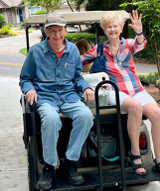Input of a Grief Counselor
Three Short Case Studies: Thoughts and Input of a Grief Counselor by Michael C. LaFerney Ph.D
Case Study One: Dealing With Anger and Guilt
A 78 year-old resident of nursing home dies in the hospital 10 days after being diagnosed with Covid19.
Her daughter is dealing with several emotions and feelings. First she feels guilt that “I put her in the nursing home- if I would have kept her home she wouldn't have caught the virus and died.” She also feels anger that her mother died without other family members not being able to be with her when she died. "She died alone.” She is shocked at how fast and sudden the death occurred. "Two weeks ago she was fine and now she's gone! She didn't even have a funeral”
I would talk about her feelings. I would be concerned that her guilt and anger could be turned inward and lead to complicated grief. I would point out how she had her mother in the nursing home due to love and wanting her to be cared for (and it was the right decision at the time) to ease the guilt. The virus could be caught anywhere, and the hospital policy of not allowing visitors in was beyond her control .Also her mother would want her to be safe and not be exposed to it. The most important element at this point is to get her daughter to open up and talk about it. In a further stage we can discuss having a remembrance ceremony or setting up a remembrance website so her daughter can give her a proper recognition, and a ceremony and get the support of others. A hospital staff nurse will be able to confide that she didn't die alone. "I was with her and held her hand.”
The idea of a website is a problem-solving technique to relieve the daughter's despair that her mother didn't have a funeral. In some communities where I live people drive by in a parade of cares honking by the houses of those who lost a loved one in a show of support.
Hopefully with support as time goes by she will accept that it was a pandemic-not her fault and it was the power of this situation that led to her not being with her mother at death or having a proper funeral, but she took steps to remember and honor her mother in a difficult situation.
Case Study Two: Anxiety, Panic Attack and Attachment Issues
Jane's mother died a month ago. Jane is now having anxiety and panic attacks. She was very close to her mom (attachment) and her mother would give her advice and support. Jane wanders how she will cope. As a psychiatric clinical nurse specialist, I would start her on an antidepressant to block panic attacks and some anti anxiety medication for short term as needed until the antidepressant starts working. I would start counseling to allow Jane to vent her feelings. I would point out how much Jane has done in her life to boost her confidence while acknowledging her mothers support.This to build up her confidence that she has and can be successful. I'd explore the fear of death in her own life and what supports Jane has as she is not married. Jane states she is seeing someone who is supportive and she has a network of friends at work she can confide in.
I would problem-solve with Jane as to what activities she can engage time in, as she would spend a lot of time visiting, playing games, and she loved gardening with her mom. Can she continue these activities with someone else for example? Jane joins a gardening club. With time and support Jane will not need any medication as panic attacks will stop and she will engage in supportive activities with others to help fill the void in her life her mothers death brought.
Case Study Three: The Caregiver
Mike's wife, Susan, dies after along battle with brain cancer which had metastasized from breast cancer. Susan went through chemo and radiation with Mike with her every step of the way. They though she was in remission but it returned and spread to her brain and was inoperable. Mike took a leave of absence from work to care from her at home and when he could no longer do it he placed her in a nursing facility where he spent everyday after work with her until she passed. Although he knew it was terminal he is in shock. She was only 42 as is Mike. They have no children. Mike is angry, has lost faith in God “How could God take her so good and young'' and other than work has no interests as he spent the past year as her caregiver. He feels alone as “I've lost my best friend."
He fears being alone, not being loved. He feels guilty if he thinks of any possible future relationship. When he is alone he cries when thinking of her. He doesn't know what to do next.
As his counselor I advise him not to make any big decisions at this time as his emotions and confusion clouds his judgment. Getting involved in another relationship too soon could prevent and delay the grieving process. Mike initially felt numb after she died, he began pining for her and would talk to her although she is gone and would dream she is still alive. He is now in a state of despair and realizes he needs to reorganize his life. He starts bereavement counseling and after a period of working on acceptance and processing the pain he is ready to readjust . He develops some interests to have more to life than just work. He also knows through counseling that his wife would want him to be happy and share love with someone. He realizes that he can do this, and still keep his loving connection to her, and her memory. He is grateful for the time he had with her and realizes the best way to honor her is to move on to a happy and productive existence.
About the Author
Michael C. LaFerney,PhD, RN, PMHCNS-BC, is a psychiatric clinical nurse specialist at Arbour SeniorCare in Haverhill, Massachusetts, USA./adjunct professor of Psychology at Quincy College, MA and certified grief and bereavement counselor.




